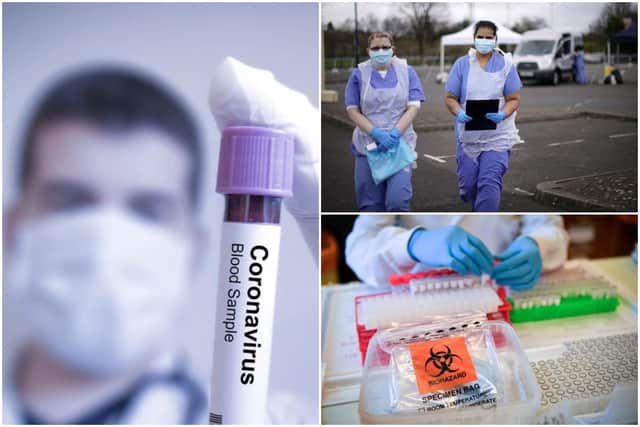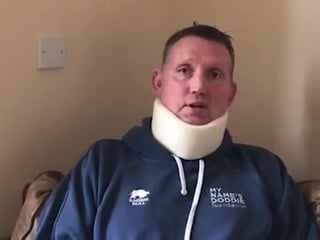Scots feeling unwell urged to contact health service after surge in deaths
Sick Scots have been urged to contact the health service after new figures revealed a dramatic rise in the overall number of deaths in Scotland.
In the first week of this month there were 1,741 recorded deaths, a rise of 643 on the average of 1,098 in the same period over the past five years.
Of those 643 deaths, 282 have been linked to coronavirus.


Advertisement
Hide AdAdvertisement
Hide AdInterim chief medical officer Dr Gregor Smith said yesterday that parts of the health service are now “eerily quiet” and doctors fear people are not seeking medical help for illnesses and symptoms unrelated to the Covid-19 pandemic.
Dr Smith warned sick people should still go to their doctors or to hospital if they are unwell, and that medics were finding the lack of non-coronavirus cases “disconcerting”.
His warning came after National Records of Scotland (NRS) published the first of a weekly series of reports that will count all deaths in which coronavirus is recorded as being relevant.
Figures published daily by the Scottish Government only show the number of patients who have tested positive in hospital for the virus, and those who have subsequently died.
The NRS recorded 354 deaths from 16 March to 5 April – a significantly higher total than the figure of 220 previously announced for the same period.
Urging unwell people not to avoid seeking help, Dr Smith said: “Your NHS remains open to you.”
The GP, who has stepped into the role following Dr Catherine Calderwood’s resignation, added: “When I’ve had conversations with clinicians and nurses across the country, one thing keeps coming back to me – that the system feels eerily quiet in relation to people presenting with illness which isn’t Covid-19 right now.
“That, as a clinician, is immediately disconcerting because that illness hasn’t gone somewhere – it still exists – and people are perhaps making a choice not to present just now.
Advertisement
Hide AdAdvertisement
Hide Ad“If people are experiencing symptoms like chest pain, bleeding or numerous other symptoms that people sometimes try to put off seeking help, these are things you should be seeking help for.
“I want to get the message across very, very clearly to everybody that we, as clinicians, need to see you when you have these symptoms.”
At her daily briefing in Edinburgh yesterday, First Minister Nicola Sturgeon said many of the coronavirus measures that are in place to deal with people with Covid-19 were, in part, to ensure that those with other illnesses could still access the treatment they required.
Asked about concerns that people are not seeking medical help and advice because of the coronavirus, Ms Sturgeon acknowledged that people are less likely to visit hospital or their GP, but that there was not yet enough evidence “to say that people are dying for those reasons”.
On the issue of people not wanting to put additional pressure on the NHS, she added: “That sentiment is one that we appreciate, but we don’t want people to not come forward if they are worried about their health.
“Other illnesses haven’t gone away because of coronavirus.”
Ms Sturgeon said potential flaws with the government’s coronavirus response or an overstretched health service would not be a “reasonable or safe conclusion to draw” when asked about the higher-than-average death rate – even when accounting for those linked to Covid-19.
Nobody is immune
The First Minister also warned “nobody is immune” and that while the majority of people who have died after contracting the virus were aged 75 and over, evidence proved it could infect all age groups.
The NRS report aims to provide a more detailed picture of the virus’ impact by including deaths outside of hospital.
Advertisement
Hide AdAdvertisement
Hide AdIt shows a large spike in Covid-19 related deaths in the week beginning 30 March, a trend that health officials will be examining closely.
More details on death figures
People in the 75 to 84 age range were the most affected, but four people in the 15 to 44 age range also died.
The NRS statistics include more detail on age and gender. Of the 354 deaths, 197 were male and 157 were female.
Four people who died were aged between 15 and 44, and 44 were aged 45-64. The rest of the deaths – more than 85 per cent of the total – were among those aged over 65.
Ms Sturgeon said: “These new weekly figures include more detailed information than previously.
“These breakdowns show that those who are older are more likely to die of Covid-19, but they show that nobody is immune, so everybody should follow the instructions.”
She added: “This information is also essential to help us understand who is most severely impacted by the virus and where there are any hotspots. It also helps us plan for beds in hospitals and when the peak is likely to pass.
“I understand that the figures can make us feel powerless and something we can’t see or feel is taking lives, but by following the rules and by self-isolating, all of us can help to reduce the number of deaths.”
Highest death figure yet
Advertisement
Hide AdAdvertisement
Hide AdA total of 366 deaths from Covid-19 were announced yesterday, the highest daily total yet.
The First Minister said the difference in the two figures of 366 and 354 is partly down to a time lag, as well as the differences in recording methods.
Further information published on the Scottish Government website for 1-7 April showed 7,909 NHS Scotland staff were absent on Tuesday, down from a weekly high of 10,391 on 2 April.
Of those absent on Tuesday, 3,342 were nurses and midwifes, 252 were medical and dental staff and 4,315 were classed as “other”.
Statistics for Tuesday showed 566 ambulance attendances for suspected Covid-19, more than a third of all 1,554 call-outs. Paramedics took 333 people to hospital suspected to have the virus.There were 984 calls to the coronavirus helpline and 4,428 calls to the 111 number. A total of 725 people were in hospital despite being medically fit for discharge.
Comments
Want to join the conversation? Please or to comment on this article.
